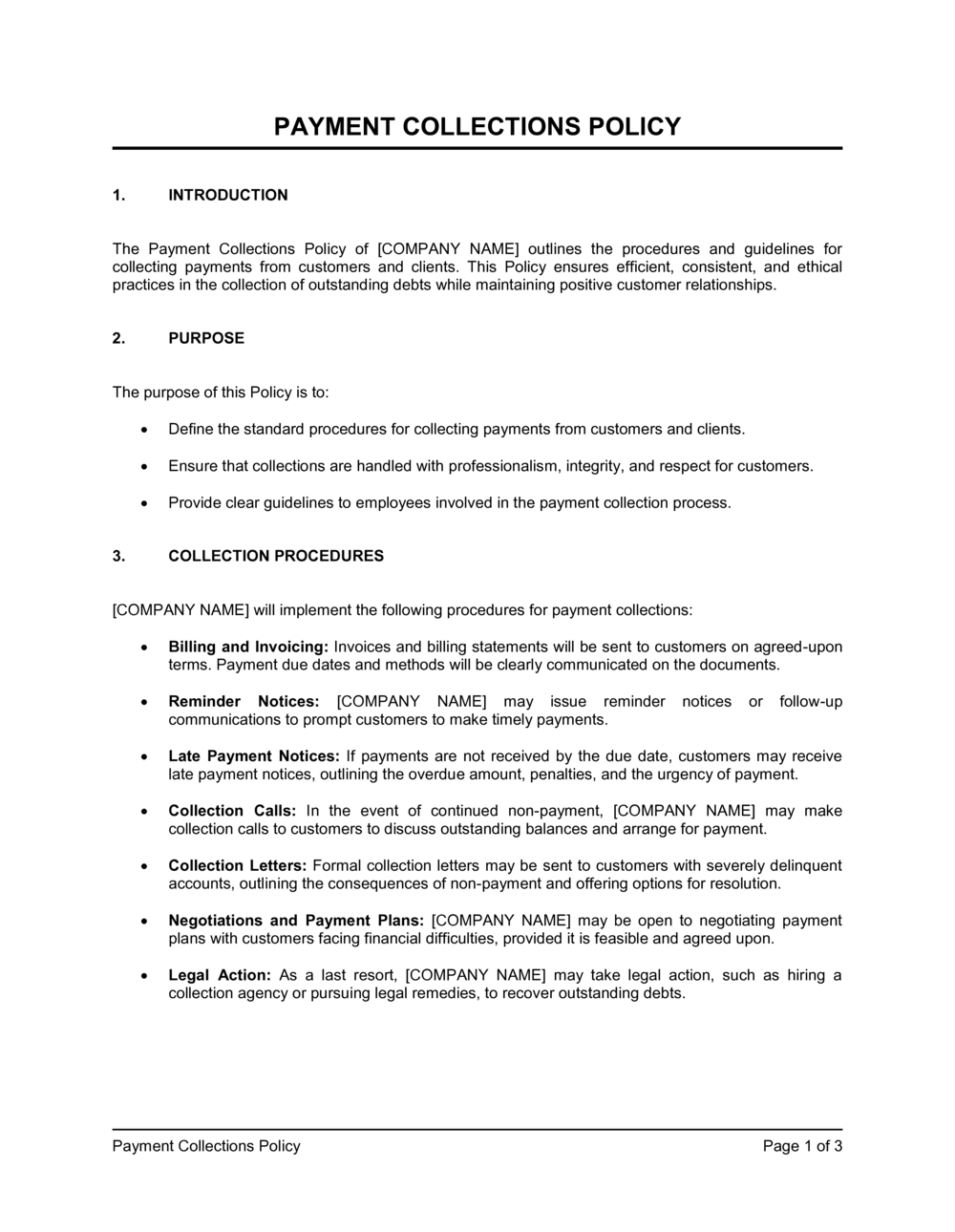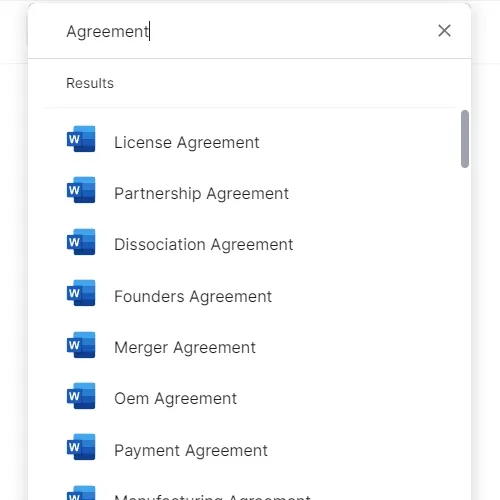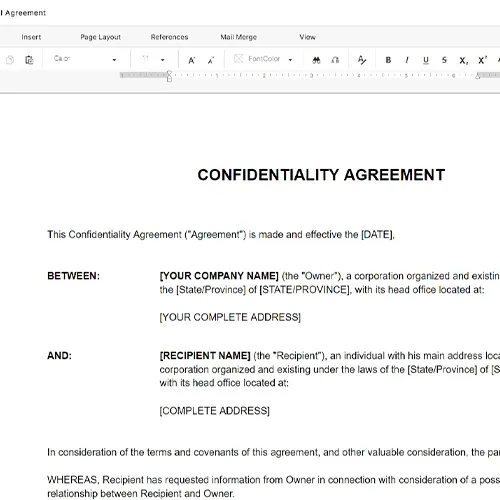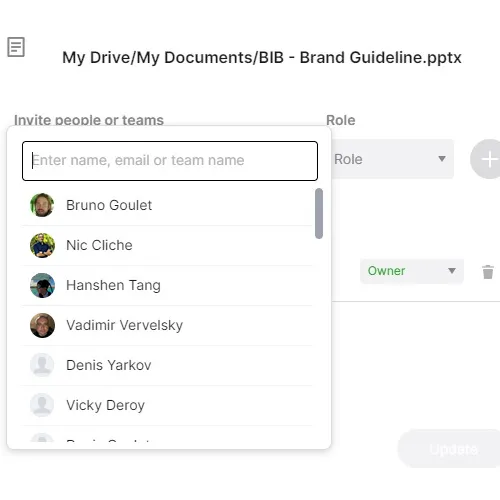Payment Collections Policy Template

Document content
This payment collections policy template has 3 pages and is a MS Word file type listed under our human resources documents.
Sample of our payment collections policy template:
PAYMENT COLLECTIONS POLICY INTRODUCTION The Payment Collections Policy of [COMPANY NAME] outlines the procedures and guidelines for collecting payments from customers and clients. This Policy ensures efficient, consistent, and ethical practices in the collection of outstanding debts while maintaining positive customer relationships. PURPOSE The purpose of this Policy is to: Define the standard procedures for collecting payments from customers and clients. Ensure that collections are handled with professionalism, integrity, and respect for customers. Provide clear guidelines to employees involved in the payment collection process. COLLECTION PROCEDURES [COMPANY NAME] will implement the following procedures for payment collections: Billing and Invoicing: Invoices and billing statements will be sent to customers on agreed-upon terms. Payment due dates and methods will be clearly communicated on the documents. Reminder Notices: [COMPANY NAME] may issue reminder notices or follow-up communications to prompt customers to make timely payments. Late Payment Notices: If payments are not received by the due date, customers may receive late payment notices, outlining the overdue amount, penalties, and the urgency of payment. Collection Calls: In the event of continued non-payment, [COMPANY NAME] may make collection calls to customers to discuss outstanding balances and arrange for payment. Collection Letters: Formal collection letters may be sent to customers with severely delinquent accounts, outlining the consequences of non-payment and offering options for resolution. Negotiations and Payment Plans: [COMPANY NAME] may be open to negotiating payment plans with customers facing financial difficulties, provided it is feasible and agreed upon. Legal Action: As a last resort, [COMPANY NAME] may take legal action, such as hiring a collection agency or pursuing legal remedies, to recover outstanding debts. RESPONSIBILITIES The responsibilities for payment collections include: Finance Department: The Finance Department is responsible for issuing invoices, monitoring payment due dates, and coordinating the initial stages of the collections process. Collections Team: The collections team, if applicable, is responsible for the more assertive collection activities, including follow-up calls, collection letters, and negotiations. CUSTOMER RELATIONSHIPS Maintaining positive customer relationships is a core value of [COMPANY NAME]. This commitment extends to all interactions, including those that involve the collections process
Reviewed on

Document content
This payment collections policy template has 3 pages and is a MS Word file type listed under our human resources documents.
Sample of our payment collections policy template:
PAYMENT COLLECTIONS POLICY INTRODUCTION The Payment Collections Policy of [COMPANY NAME] outlines the procedures and guidelines for collecting payments from customers and clients. This Policy ensures efficient, consistent, and ethical practices in the collection of outstanding debts while maintaining positive customer relationships. PURPOSE The purpose of this Policy is to: Define the standard procedures for collecting payments from customers and clients. Ensure that collections are handled with professionalism, integrity, and respect for customers. Provide clear guidelines to employees involved in the payment collection process. COLLECTION PROCEDURES [COMPANY NAME] will implement the following procedures for payment collections: Billing and Invoicing: Invoices and billing statements will be sent to customers on agreed-upon terms. Payment due dates and methods will be clearly communicated on the documents. Reminder Notices: [COMPANY NAME] may issue reminder notices or follow-up communications to prompt customers to make timely payments. Late Payment Notices: If payments are not received by the due date, customers may receive late payment notices, outlining the overdue amount, penalties, and the urgency of payment. Collection Calls: In the event of continued non-payment, [COMPANY NAME] may make collection calls to customers to discuss outstanding balances and arrange for payment. Collection Letters: Formal collection letters may be sent to customers with severely delinquent accounts, outlining the consequences of non-payment and offering options for resolution. Negotiations and Payment Plans: [COMPANY NAME] may be open to negotiating payment plans with customers facing financial difficulties, provided it is feasible and agreed upon. Legal Action: As a last resort, [COMPANY NAME] may take legal action, such as hiring a collection agency or pursuing legal remedies, to recover outstanding debts. RESPONSIBILITIES The responsibilities for payment collections include: Finance Department: The Finance Department is responsible for issuing invoices, monitoring payment due dates, and coordinating the initial stages of the collections process. Collections Team: The collections team, if applicable, is responsible for the more assertive collection activities, including follow-up calls, collection letters, and negotiations. CUSTOMER RELATIONSHIPS Maintaining positive customer relationships is a core value of [COMPANY NAME]. This commitment extends to all interactions, including those that involve the collections process
Easily Create Any Business Document You Need in Minutes.

Download or open template
Access over 3,000+ business and legal templates for any business task, project or initiative.

Edit and fill in the blanks
Customize your ready-made business document template and save it in the cloud.

Save, Share, Export, or Sign
Share your files and folders with your team. Create a space of seamless collaboration.



